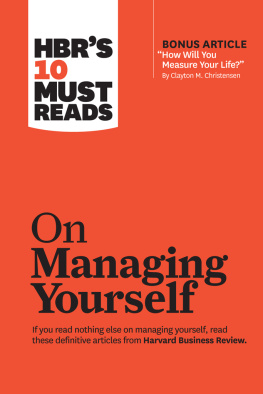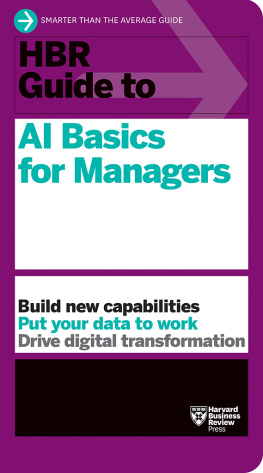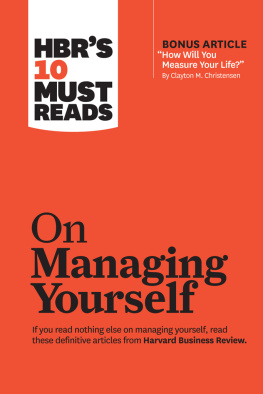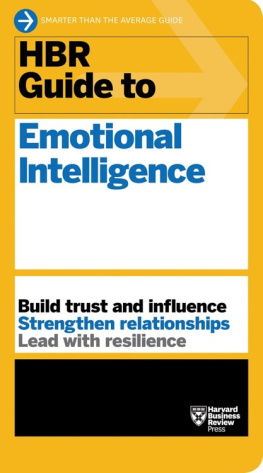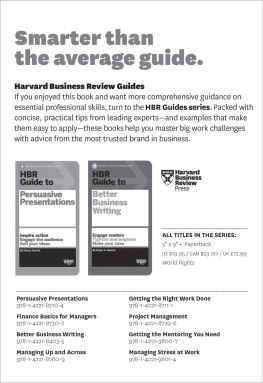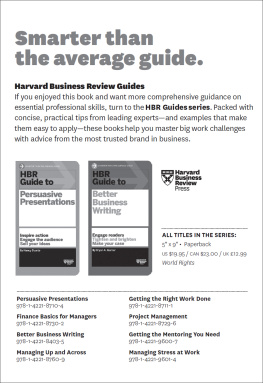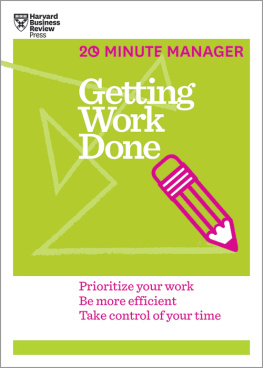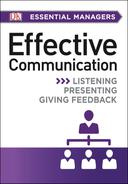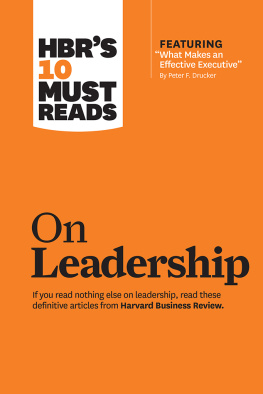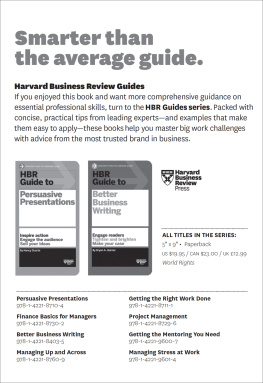Giving Effective Feedback

Get up to speed fast on essential business skills. Whether youre looking for a crash course or a brief refresher, youll find just what you need in HBRs 20-Minute Manager seriesfoundational reading for ambitious professionals and aspiring executives. Each book is a concise, practical primer, so youll have time to brush up on a variety of key management topics.
Advice you can quickly read and apply, from the most trusted source in business.
Titles include:
Creating Business Plans
Delegating Work
Finance Basics
Getting Work Done
Giving Effective Feedback
Managing Projects
Managing Time
Managing Up
Presentations
Running Meetings

Giving Effective Feedback
Check in regularly
Handle tough conversations
Bring out the best
HARVARD BUSINESS REVIEW PRESS
Boston, Massachusetts
HBR Press Quantity Sales Discounts
Harvard Business Review Press titles are available at significant quantity discounts when purchased in bulk for client gifts, sales promotions, and premiums. Special editions, including books with corporate logos, customized covers, and letters from the company or CEO printed in the front matter, as well as excerpts of existing books, can also be created in large quantities for special needs.
For details and discount information for both print and ebook formats, contact
Copyright 2014 Harvard Business School Publishing Corporation
All rights reserved
No part of this publication may be reproduced, stored in or introduced into a retrieval system, or transmitted, in any form, or by any means (electronic, mechanical, photocopying, recording, or otherwise), without the prior permission of the publisher. Requests for permission should be directed to or mailed to Permissions, Harvard Business School Publishing, 60 Harvard Way, Boston, Massachusetts 02163.
The web addresses referenced in this book were live and correct at the time of the books publication but may be subject to change.
Library of Congress Cataloging-in-Publication Data
Giving effective feedback : foster positive change, influence behavior, strengthen relationships.
pages cm. (20-minute manager series) Includes index.
ISBN 978-1-62527-542-4 (alk. paper)
1. Communication in personnel management. 2. Interpersonal communication. 3. Communication in management. 4. Supervision of employees. 5. Problem employees. 6. Feedback (Psychology)
HF5549.5.C6G577 2014
658.3'125dc23
2014021082
ISBN: 9781625275424
eISBN: 9781625275479
Preview
As you interact with your colleagues, direct reports, and others within your organization, are you sharing feedback with them? Communicating in the right way with others about their actions can reinforce positive behavior and move them toward more productive courses of actionoutcomes that benefit everyone. This book walks you through the basics of giving effective, results-oriented feedback so that it can become an integral part of how you work with others. Youll learn to:
Recognize opportunities for giving feedback.
Choose the best time and topics for discussion.
Establish a rapport with others while giving them feedback.
Ensure that your comments are valued.
Prevent and manage volatile feedback situations.
Create a work climate that encourages performance discussions.
Contents
Giving Effective Feedback
Why Feedback Matters
Why Feedback Matters
Youve just received word that one of your direct reports, Judy, an IT help desk provider, was rude to a customer on the phone. You work well with Judy; she is one of your top performers and has never had a complaint filed against her. But the customer was very upset after the call. Is it worth raising the issue with Judy and risking your relationship with her?
Yes. Giving constructive feedback when its needed is essential to creating a productive work environmentand it doesnt have to threaten your relationships. But you must give that feedback in the right way, so that the person receiving it can use what he hears from you to improve his own performance and that of his team and the organization.
Although the prospect of giving feedback often seems intimidating, it helps to remember that doing so is essential and, ultimately, beneficial. A feedback discussion is an opportunity for you to share your observations with others about their job performance to elicit productive change. In the example earlier, you want to explore with Judy what happened and make sure that her behavior isnt repeatedfor the sake of her own development and for that of the organization.
Feedback is often corrective, which means its intended to help the recipient change course or adjust practices when the current ones arent working. It can also be positive, aimed at reinforcing good work and patterns of problem solving. Heres what you can accomplish by giving feedback:
Show your direct reports and colleagues that youre attentive to them and their performance.
Signal appreciation for a job well done.
Redirect undesirable behavior.
Point out a more productive course of action.
Contribute to others learning and development.
Motivate and inspire individuals to higher levels of performance.
Strengthen your rapport with coworkers.
Foster open communication and enhance teamwork.
Delivering feedback should be a regular part of anyones job, and it shouldnt be reserved for your direct reports. In select situations it can also be helpful to give feedback to a colleague or even a boss.
Consider the following example, in which constructive feedback is successfully communicated at an organization shortly after the testing of a new production process:
Youve noticed that a bottleneck is occurring during a production phase overseen by your direct report Bill, who normally prides himself on his efficiency. After gathering the facts, you approach him to acknowledge the quality of his prior work and ask what he thinks is happening now. In discussing the situation, you discover that Bill has a misconceptionnamely, that the new production process requires more recordkeeping than the old one did. You clarify that the level of recordkeeping should remain the same and that its only the format that has changed. As you and Bill look through his records together, you show him which elements he can omit, allowing him to save time and energyand to return to his usual level of efficiency.
The feedback you give to Bill leads to a highly valuable change. By intervening early, you get durable results and also enable Bill to feel good about his work again. Feedback that people actually hear and use has this effect.
What makes feedback effective?
In order for your feedback to be heard and used, you need to deliver it at the right time and in the right way. To do that well, you need to understand what makes feedback most effective:
It is shared frequently and in context.
It aims to achieve a specific outcome.
It is realistic in its expectations.
It shows respect for the recipient.
It is a two-way conversation.
It is expressed as a point of view, rather than an absolute truth.
It assumes an opportunity for follow-up.
Next page



